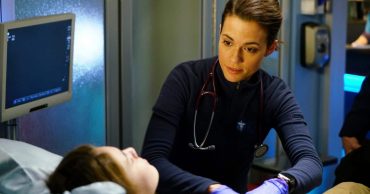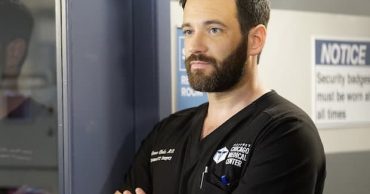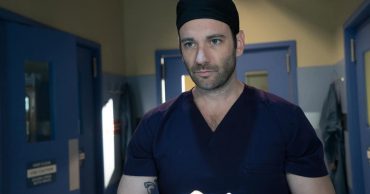
The evolution of medicine does not happen without diving into grey areas. Anyone who thinks that medicine is an exact science 100% of the time is dead wrong. The experimental and psychological factors involved in treating people have to be taken into account, especially when faced with situations with no good solutions. On the midseason finale of Chicago Med, the doctors deal with ethically grey cases which they must carefully evaluate. This is especially true when April is one of their patients, and her health takes several drastic turns in a matter of hours.
Dr. Halstead and Dr. Shore seem to be the real deal. They’ve got a shared closet and upcoming housewarming party which says so. That doesn’t mean his connection with Dr. Manning goes away. Their bond over their patients, even when they don’t always agree, is extremely strong. This week they treat a patient in need of a kidney transplant, and his brother is a perfect match. The catch is that his brother is HIV positive, a fact that is a family secret because of homophobia in the family. Time isn’t on their side, so despite the personal and medical circumstances, the brothers reach an agreement for an in-family kidney donation. The problem is that the procedure is not only unethical, it’s illegal. However, organ donations are not illegal between already infected HIV patients. Oh, we’re getting into some extremely grey ethical territory.
Dr. Choi and Dr. Reese haven’t given up looking for Danny, to the point where Reese is actually losing a lot of sleep and gaining much anxiety. Here these doctors are worrying about an abused, sex-trafficked young man who needs more help than any one person can give him. It wasn’t for nothing, but it was just too much. Lindsay has to break the news to Reese that Danny died. This was the wrong time for Dr. Choi to look after a selfish, sociopathic prison inmate who purposely puts himself in the hospital as a vacation. It’s extremely taxing to take care of someone so cavalier about their health, but giving him the satisfaction of anger would only feed the sociopath’s glee.
As if April didn’t have enough to worry about with her TB flaring up, she also finds out that she’s pregnant. It seems April’s TB meds interfered with her birth control, then the pregnancy interfered with her TB, and here we are. Once she tells Tate they are both excited. They figure that they can treat April’s TB, then plan for the baby’s arrival. Unfortunately April contracted a particular strain of TB which can only be treated with a particular medication, one which causes neural tube defects in a fetus. April’s a brilliant nurse, she knows the risks to her health and the health of her baby. If she takes the treatment, her baby could be affected. If she doesn’t take the treatment, she and her baby will die. The odds are horrible either way, but April has to choose the option which gives them both their best chance.
Dr. Charles is sitting on a mountain of pent up worries. When your psychiatrist brain and your father brain collude, it’s a bad combination. He starts thinking too much about Robyn and Dr. Rhodes’s budding friendship and thinks the combination of their issues is a powder keg. You can guess how well Robyn reacts to her father’s interference. It’s not just personal concerns that plague Charles, it’s professional ones. Dr. Rhodes and Dr. Latham treat a young girl with Williams’ Syndrome in need of heart surgery. The problem is they underestimate the girl’s cognitive ability to consent to the surgery. Williams Syndrome causes a person to be exceptionally nice and overly trusting, to the point where they are unable to recognize dangerous people. They need to respect their patient’s limitations and her attributes. Dr. Charles didn’t consult on this particular case, but the way Dr. Rhodes handled the situation will be a sign of their clashing personalities in cases to come.
Which grey line was the most challenging?
 Follow Us
Follow Us




